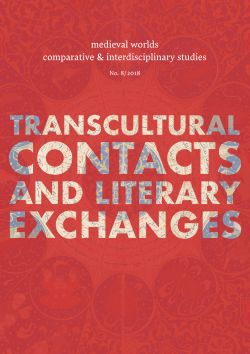Li Qiang,
Stefanos Kordosis
S. 109 - 125
doi:
10.1553/medievalworlds_no8_2018s109
Verlag der Österreichischen Akademie der Wissenschaften
doi:
10.1553/medievalworlds_no8_2018s109
Abstract:
The geopolitics pertaining to the Silk Road network in the period from the 6th to the 7th century (the final, albeit important, period of Late Antiquity) was intertwined with highly strategic dimensions. The frequent arrival of hoards of nomadic peoples from inner Eurasia at the borders of the existing sedentary empires and their encounters and interactions formed the complicated political ecology of the period. These empires attempted to take advantage of the newly shaped situation arising after such great movements strategically, each in their own interest. How did they achieve their goals and what problems were they confronted with? In this paper, I will focus on the relations the Western Türks had with Byzantium and use it as an example in order to resurvey these complicated geopolitics. In the first part, attention will be given to the collection of Byzantine literature concerning the Western Türks. Then, on the basis of the sources, the four main exchanges of delegations between the Western Türks and Byzantium will be discussed, in which the important status of the 563 embassy – as it was the first Türk delegation sent to Byzantium – will be emphasized. The possible motives behind the dispatch of the delegations and the repercussions they had will be presented. Finally, through reviewing the diplomatic communication between the Western Türks and Byzantium, attention will be turned to the general picture of geopolitics along the Silk Road, claiming that the great empire of the West – similar to today’s superpowers – by means of their resources (mainly diplomacy) manipulated the geopolitics on the Silk Road, especially the nomadic people pursuing their own survival and interests, who were only treated as pieces on a chessboard for keeping the balance with the rest of the superpowers.
Western Türks; Byzantium; Geopolitics; Diplomacy; Nomads; Silk Road
Published Online:
2018/11/30 07:32:58
Object Identifier:
0xc1aa5576 0x003a16af
Rights:All rights reserved.For questions regarding copyright and copies please contact us by email.
medieval worlds provides a forum for comparative, interdisciplinary and transcultural studies of the Middle Ages. Its aim is to overcome disciplinary boundaries, regional limits and national research traditions in Medieval Studies, to open up new spaces for discussion, and to help developing global perspectives. We focus on the period from c. 400 to 1500 CE but do not stick to rigid periodization.
medieval worlds is open to submissions of broadly comparative studies and matters of global interest, whether in single articles, companion papers, smaller clusters, or special issues on a subject of global/comparative history. We particularly invite studies of wide-ranging connectivity or comparison between different world regions.
Apart from research articles, medieval worlds publishes ongoing debates and project and conference reports on comparative medieval research.
Editor’s Preface
Walter Pohl and Ingrid Hartl
World Literature is Trans-Imperial: A Medieval and a Modern Approach
Christian Høgel
The Global Eminent Life: Sixth-Century Collected Biographies from Gregory of Tours to Huijiao of Jiaxiang Temple
James T. Palmer
The Aristotle of Pippin III. Greek Books Sent to the Frankish Court (ca. 758 AD)
Christian Gastgeber
Biblical Elements and the ‘Other’ in the Chronicon regum Legionensium
Patrick S. Marschner
“The messenger is the place of a man’s judgment”: Diplomacy between Emperors and Caliphs in the Tenth Century
Courtney Luckhardt
The Geopolitics on the Silk Road: Resurveying the Relationship of the Western Türks with Byzantium through Their Diplomatic Communications
Li Qiang and Stefanos Kordosis
Project Reports
Dynamics in Buddhist Transfer in Eastern Central Asia 6th-14th Centuries: A Project Report
BuddhistRoad Team
Mobility, Empire and Cross-Cultural Contacts in Mongol Eurasia (MONGOL)
Michal Biran
Greek into Arabic. Philosophical Concepts and Linguistic Bridges
Cristina D’Ancona, Gerhard Endress and Andrea Bozzi
Writing the History of Aristotelian Logic During the Long Ninth Century. Some Remarks and Preliminary Results
Christophe Erismann
The THESIS Project
Monica Brinzei
Origins of the Vernacular Mode: Medieval Theology, Politics and Religious Identities
Pavlína Rychterová




 Home
Home Print
Print
 References
References
 Share
Share
